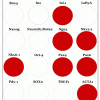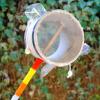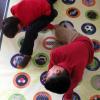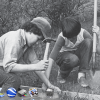Search Results
Showing results 141 to 160 of 175

Test the Finger Wrinkle Hypothesis
Source Institutions
Learners create a tool to measure how well they grip a wet object when their fingers are smooth versus wrinkly. Are smooth or wrinkly fingers better at holding on to the object?

Moving and Working in Space
Source Institutions
In this activity, groups of four learners must complete a set of four manual tasks. The restrictions are that they must complete the tasks in a limited time while wearing garden or rubber gloves.

Seeing the World Through a Different Lens
Source Institutions
Learners participate in a variety of activities modeling different disabilities.

Trail Impact Study
Source Institutions
In this outdoor activity, learners plan a simple foot path and create an environmental impact study of the natural area where the path would be.

Microarrays and Stem Cells
Source Institutions
In this activity, learners use microarray technology to determine which genes are turned on and off at various points in the differentiation of pluripotent stem cells on their way to becoming pancreat

Challenge: Microgravity
Source Institutions
In this activity about the circulatory system and space travel (on page 38 of the PDF), learners use water balloons to simulate the effects of gravity and microgravity on fluid distribution in the bod

Torsion Drum
Source Institutions
In this activity, learners build a musical drum using a cardboard tube, plastic wrap, and beads.

Exploring Fabrication: Gummy Capsules
Source Institutions
In this activity, learners make self-assembled polymer spheres.

Artificial Intelligence: The Intelligent Piece of Paper
Source Institutions
This activity explores what it means for a computer to be intelligent and introduces the topic of what a computer program is and how everything computers do simply involves following instructions writ

Energetic Musical Instruments
Source Institutions
Learners design and create musical instruments from common objects; their challenge is to create an instrument that can make three different tones.

Recycling Rules: Understanding Recycling and a MRF
Source Institutions
In this activity, learners simulate the separation techniques that materials recovery facilities (MRFs) use and then design their own series of recycling techniques.

Exploring Size: Scented Solutions
Source Institutions
This is an activity in which learners will find that they can detect differences in concentration better with their nose (smelling) than with their eyes (seeing).

Exploring Size: StretchAbility
Source Institutions
In this game, learners explore the different sizes of things in the world. In this Twister-like game, learners must place a hand or foot on a circle of the right scale - macro, micro, or nano.
Butterflies in Space
Source Institutions
The Butterflies in Space Teacher's Guide uses "life in space" to encourage learners to conduct their own open-ended scientific investigations.

Trail Construction
Source Institutions
In this highly physical outdoor activity, learners construct and compare experimental trail sections to select the best trail-construction technique for their site.

I Can't Take the Pressure!
Learners develop an understanding of air pressure in two different activities.

Horton Senses Something Small
Source Institutions
In this story time program, young learners listen to the Dr.

Biomimicry: Synthetic Gecko Tape Through Nanomolding
Source Institutions
In this activity/demo, learners examine a synthetic gecko tape with micron sized hairs that mimics the behavior of the gecko foot.

Stabilization Wedges Game
Source Institutions
This game introduces learners to the scale of the greenhouse gas problem, plus technologies that already exist to dramatically reduce our carbon emissions and prevent climate change.

Biotechnology Through Time
Source Institutions
In this activity, learners investigate the history and development of agricultural biotechnology.
